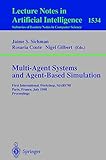Multi-Agent Systems and Agent-Based Simulation [electronic resource] : First International Workshop, MABS ’98, Paris, France, July 4-6, 1998. Proceedings / edited by Jaime Simão Sichman, Rosaria Conte, Nigel Gilbert.
Material type: TextSeries: Lecture Notes in Computer Science ; 1534Publisher: Berlin, Heidelberg : Springer Berlin Heidelberg, 1998Description: IX, 236 p. online resourceContent type: text Media type: computer Carrier type: online resourceISBN: 9783540492467Subject(s): Computer science | Artificial intelligence | Computer simulation | Management information systems | Computer Science | Artificial Intelligence (incl. Robotics) | Business Information Systems | Simulation and Modeling | User Interfaces and Human Computer InteractionAdditional physical formats: Printed edition:: No titleDDC classification: 006.3 LOC classification: Q334-342TJ210.2-211.495Online resources: Click here to access online
TextSeries: Lecture Notes in Computer Science ; 1534Publisher: Berlin, Heidelberg : Springer Berlin Heidelberg, 1998Description: IX, 236 p. online resourceContent type: text Media type: computer Carrier type: online resourceISBN: 9783540492467Subject(s): Computer science | Artificial intelligence | Computer simulation | Management information systems | Computer Science | Artificial Intelligence (incl. Robotics) | Business Information Systems | Simulation and Modeling | User Interfaces and Human Computer InteractionAdditional physical formats: Printed edition:: No titleDDC classification: 006.3 LOC classification: Q334-342TJ210.2-211.495Online resources: Click here to access online  E-BOOKS
E-BOOKS
| Current library | Home library | Call number | Materials specified | URL | Status | Date due | Barcode |
|---|---|---|---|---|---|---|---|
| IMSc Library | IMSc Library | Link to resource | Available | EBK6719 |
MAS and Social Simulation: A Suitable Commitment -- Agent-Based Modeling vs. Equation-Based Modeling: A Case Study and Users’ Guide -- Simulating with Cognitive Agents: The Importance of Cognitive Emergence -- Social Simulation Models and Reality: Three Approaches -- Economic Theory of Renewable Resource Management: A Multi-agent System Approach -- ABCDE: Agent Based Chaotic Dynamic Emergence -- Formalising the Link between Worker and Society in Honey Bee Colonies -- Non-merchant Economy and Multi-agent System: An Analysis of Structuring Exchanges -- Dynamics of Internal and Global Structure through Linguistic Interactions -- Stereotyping, Groups and Cultural Evolution: A Case of “Second Order Emergence”? -- Finding the Best Partner: The PART-NET System -- Dependence Relations Between Roles in a Multi-Agent System -- When Agents Emerge from Agents: Introducing Multi-scale Viewpoints in Multi-agent Simulations -- ACTS in Action: Sim-ACTS – A Simulation Model Based on ACTS Theory -- Towards Modeling Other Agents: A Simulation-Based Study -- Multi-agent Architecture Integrating Heterogeneous Models of Dynamical Processes: The Representation of Time.
Fifteen papers were presented at the first workshop on Multi-Agent Systems and Agent-Based Simulation held as part of the Agents World conference in Paris, July 4-- 6, 1998. The workshop was designed to bring together two developing communities: the multi-agent systems researchers who were the core participants at Agents World, and social scientists interested in using MAS as a research tool. Most of the social sciences were represented, with contributions touching on sociology, management science, economics, psychology, environmental science, ecology, and linguistics. The workshop was organised in association with SimSoc, an informal group of social scientists who have arranged an irregular series of influential workshops on using simulation in the social sciences beginning in 1992. While the papers were quite heterogeneous in substantive domain and in their disciplinary origins, there were several themes which recurred during the workshop. One of these was considered in more depth in a round table discussion led by Jim Doran at the end of the workshop on 'Representing cognition for social simulation', which addressed the issue of whether and how cognition should be modelled. Quite divergent views were expressed, with some participants denying that individual cognition needed to be modelled at all, and others arguing that cognition must be at the centre of social simulation.


There are no comments on this title.